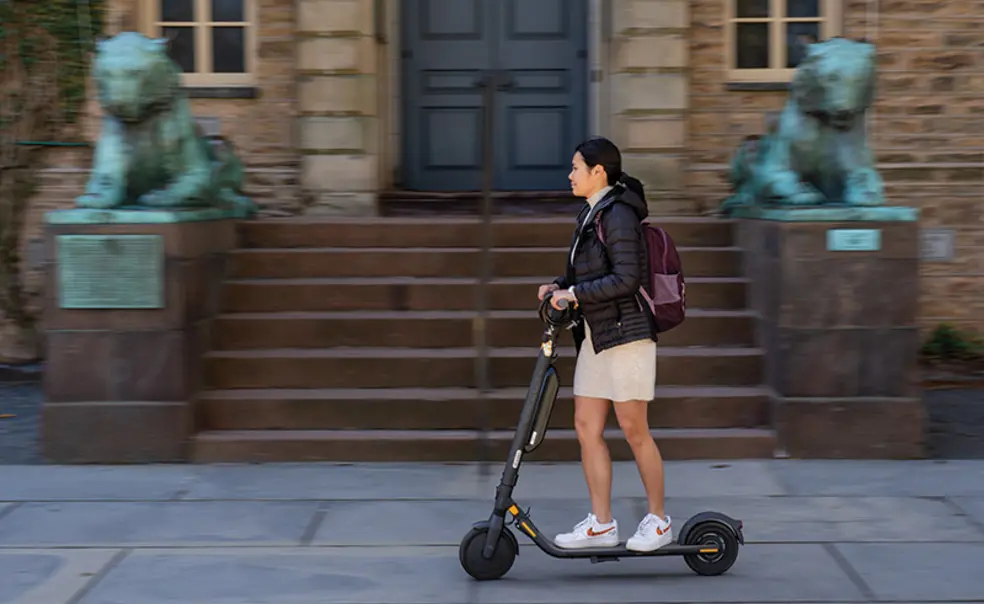Electric Scooters Banned From Campus During Peak Hours
Personal electric vehicles (PEVs) — including scooters, hoverboards, and electric skateboards — have been banned from the core of campus on weekdays between 7:30 a.m. and 4:00 p.m., the University’s Environmental, Safety, and Risk Management (ESRM) Committee announced in August.
According to an email explaining the policy, the ESRM Committee concluded that restrictions were needed to safely accommodate “the increasing usage of PEVs on campus.” In addition, construction and Princeton’s “historically narrow pathways” necessitated a change, according to an email from Charles Tennyson, director of Transportation & Parking Services.
Electric bicycles ridden manually are permitted on campus roadways, but not sidewalks; traditional bicycles, scooters, and skateboards are exempt from the policy. The email also strongly discouraged the use of PEVs on busy roadways.
The policy went into effect Aug. 25. The forbidden zone is bordered on the north by Nassau Street, on the south by Faculty Road and the boathouse, on the west by Forbes College, and on the east by Fitzrandolph Road and Murray Place.
Tennyson said the policy was implemented after the number of on-campus PEV incidents — usually a crash, collision, or injury that prompts a report to be filed — nearly doubled from 32 during the 2021-22 academic year to 54 during the 2022-23 academic year.
He told PAW that should they be needed, temporary bike racks will be installed.
Students had mixed reactions to the news, with some division between athletes, who typically travel more frequently to the farthest corners of campus, and the rest of the student body. Several students suggested the University could personalize the policy for those with unique needs, such as varsity athletes.
August Wietfeldt ’24, a physics major, said, “I understand why it’s hard for athletes who have class and practice really far away.” But ultimately, he thinks “reducing the number of scooters when there are busy periods would be a good solution.”
On the day she spoke to PAW in late August, Umalena Corniea ’27, a member of the women’s ice hockey team, received her electric scooter in the mail. She said the policy will be “really inconvenient” and that even if she sprints from class to class she won’t make it on time. At a February meeting of the Council of the Princeton University Community (CPUC), Deputy Dean of the College Elizabeth Colagiuri said the University is considering extending the time between classes. Associate Dean Katherine Stanton told PAW in September that she believes the earliest the policy could take effect is in the fall 2025 semester.
“It’s kind of unfortunate that they have so much money to build so many buildings, but they can’t make a bike or scooter lane,” Corniea said.
The town of Princeton banned bicycles, roller skates, scooters, and skateboards from many public sidewalks in the central business district last November and recently installed signs urging people to “Walk Your Wheels — It’s the Law.”
Mayor Mark Freda said there were “a lot of close calls, a lot of complaints” before the ordinance was passed, and that the situation has since improved.
“Sidewalks are mostly here in town designed for people to walk on and not really designed for any kind of device that goes 15 to 20 miles an hour,” Freda said.
David Cohen, a member of the Princeton council, told PAW in late August that the town’s Infrastructure and Operations Committee is drafting an ordinance that he expects to go before the council for a vote “within the next month or so,” and that while the policy is still being finalized, “the general inclination is to not allow personal electric vehicles on the sidewalks in town.”
Cohen said some of his colleagues on the council found the University’s new policy to be “extreme or excessive,” but he personally feels “it’s the right balance between the needs of the e-mobility users and the needs of pedestrians who need to be safe.”
The University’s email said it would assess the first month of the new policy’s implementation and update the community in October. “A failure to comply,” the message said, “could result in a full prohibition of PEVs on campus.”












No responses yet